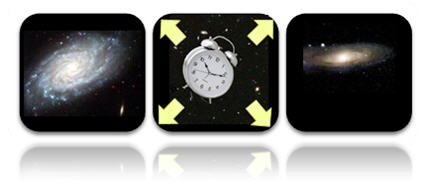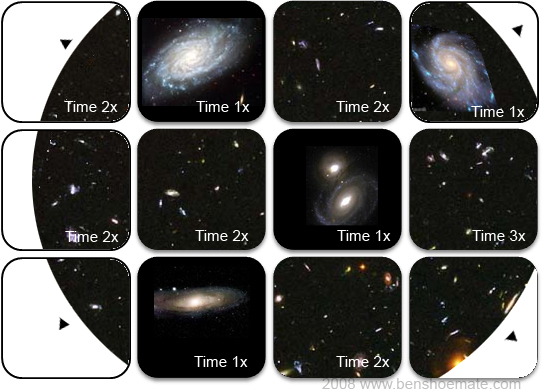I have been watching the debate about dark energy as a possible explanation of what is causing the universe to expand faster and faster (as cosmologists first discovered 10 years ago). But last night, as I was watching the new series "The Universe", I was reminded of a particularly interesting facet of Einstein's relativity theory - the effect of gravity on time. Bottom line of that theory is that time passes slower when you are inside a gravitational field.
 This is something NASA has been able to demonstrate by putting atomic clocks in orbit and that the programmers of the GPS satellite system had to take into account to make the system work properly. Clocks (and all other matter) move faster when there is less gravity. Time, as we measure and understand it, passes slower on earth, than in orbit, and it is faster still once you get away from the sun, and even faster when you get out of the Milky Way. This leaves me with 2 questions:
This is something NASA has been able to demonstrate by putting atomic clocks in orbit and that the programmers of the GPS satellite system had to take into account to make the system work properly. Clocks (and all other matter) move faster when there is less gravity. Time, as we measure and understand it, passes slower on earth, than in orbit, and it is faster still once you get away from the sun, and even faster when you get out of the Milky Way. This leaves me with 2 questions:
- If time is passing faster, the further away from a gravitation field you get, wouldn't that explain why the universe is expanding faster? Eventually, as galaxies get further apart, there is less and less gravity in inner-galactic space, thus (I would assume) time is going faster between galaxies and the "normal" expansion process would be occurring at an accelerated pace. In other words, voids grow faster than matter rich areas of the universe because everything happens faster there. Think of a large balloon that is expanding on a wall of video monitors, some of the videos are playing faster and thus that part is expanding more rapidly. Not only that, be the expansion itself is causing gravity to be less and less on an influence because the galaxies are now further away (more space-time between them). Will time eventually become a run-away engine in the vast emptiness of space? Will the speed of time approach infinity?
 Fact: The emptier space is (the less gravity) - the faster time passes.
Fact: The emptier space is (the less gravity) - the faster time passes.
One way I thought to test this would be to observe the speed of stars (if there are any) or any other matter in the "vast hole in the universe" that was discovered recently. If "emptiness" has the affect of accelerating time, that may be measurable by observing its affect on light traveling through those empty spaces. (objects opposite fast empty holes in the universe would appear closer than they really are)
- About this time/gravity relationship. I imagine that as gravity approaches infinity as in a black-hole, time approaches zero. If time is slowed down - then what does that say about the spectacular speeds of stars orbiting black-holes? Have those calculations beed adjusted for this? Is there even a mathematical way to express time passing differently in different regions of the universe?
As I type this, it also occurs to me that this may also explain why there seem to be few stars between galaxies - maybe they age and die very quickly. I don't understand the math well enough to try and calculate the relative difference in the rate of time in inner-galactic space versus on earth - much less in the middle of that billion-light year wide void, but imagine if there is a measurable between the surface of the earth, and 200 miles up in orbit, that a billion-light years of gravity free space might tack on the years pretty quickly.
If any one out there has a science background I would love to hear from you in the comments.